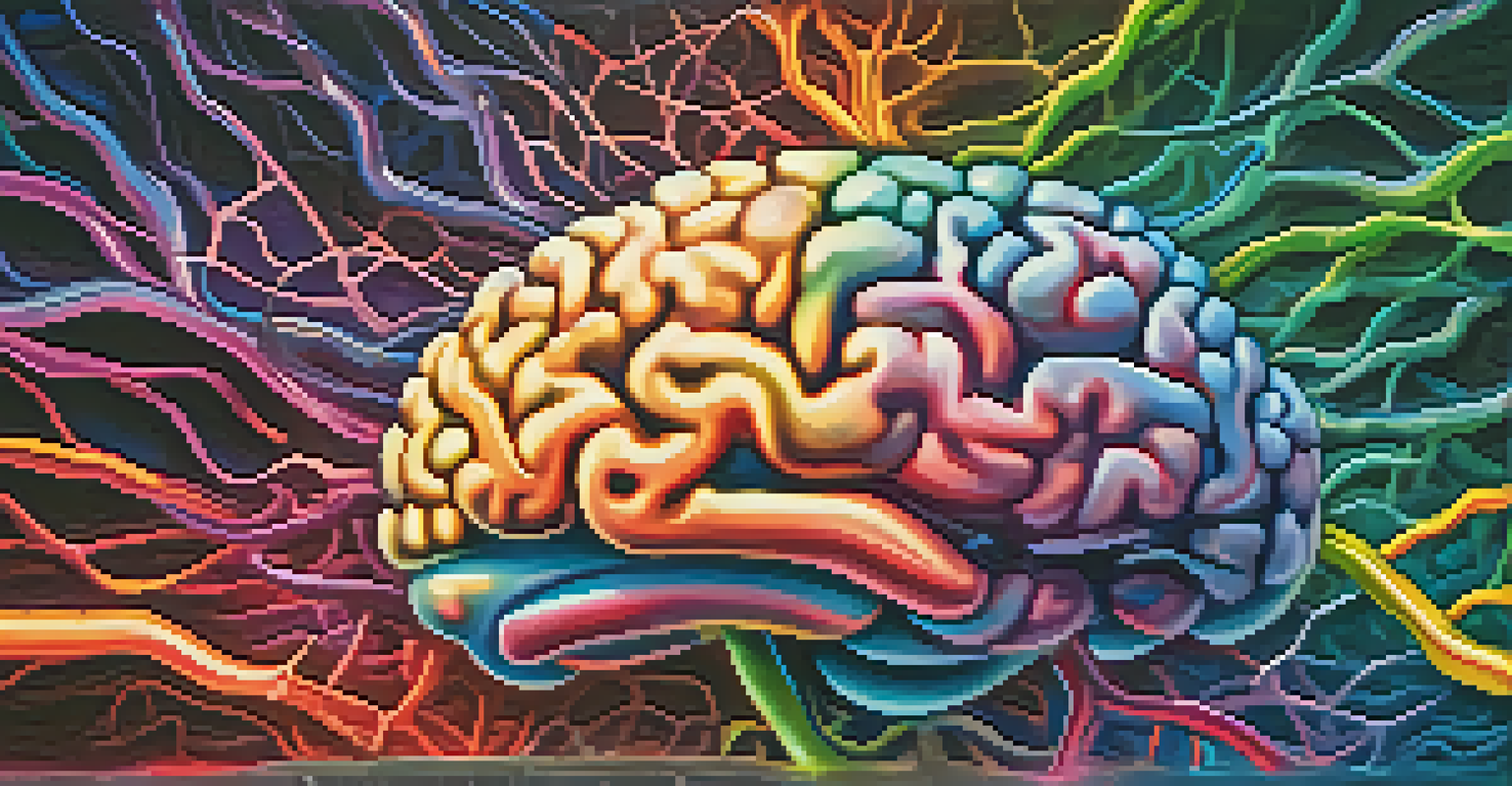Psychedelics as Therapy: A New Frontier in Recovery

Understanding Psychedelics: A Brief Overview
Psychedelics are substances that alter perception, mood, and cognitive processes. Common examples include LSD, psilocybin (magic mushrooms), and MDMA. These compounds have been used for centuries in various cultural rituals and are now being revisited in a clinical context.
Psychedelics are to the brain what a hammer is to a nail. They can break old patterns and allow for new connections to form.
Recent studies suggest that these substances can facilitate profound psychological experiences, often leading to significant emotional breakthroughs. Unlike traditional medications, which may take weeks to show effects, psychedelics can induce rapid changes in mental health, offering hope for those struggling with chronic conditions.
Understanding the potential of psychedelics requires separating the myths from the science. While they have been stigmatized in the past, ongoing research indicates their therapeutic benefits, particularly in treating conditions like PTSD, anxiety, and depression.
The Science Behind Psychedelics and Mental Health
Research into psychedelics has gained momentum, with numerous clinical trials highlighting their efficacy. These studies often focus on how psychedelics can enhance neuroplasticity, the brain's ability to reorganize itself by forming new neural connections. This ability is crucial for recovery from trauma or entrenched mental health issues.

For instance, a study published in a leading journal demonstrated that participants who underwent psilocybin therapy experienced significant reductions in depression symptoms. This suggests that psychedelics can facilitate a reset in mental patterns, opening pathways to healing that traditional therapies may not reach.
Psychedelics Show Promise for PTSD
Research indicates that psychedelics like MDMA can help individuals with PTSD process traumatic memories more effectively.
Moreover, the use of psychedelics in a controlled environment, paired with therapy, can lead to lasting changes. The combination of guided sessions and the substances can create a safe space for individuals to confront and process their emotions.
Psychedelics in Treating PTSD: A New Hope
Post-Traumatic Stress Disorder (PTSD) can be debilitating, affecting millions worldwide. Traditional treatments often include cognitive behavioral therapy and medications, but many find limited relief. Enter psychedelics, which have shown promising results in clinical settings for those with PTSD.
The mind is like a parachute. It doesn't work if it isn't open.
Studies have found that MDMA, in particular, can help patients process traumatic memories in a supportive environment. Participants have reported feeling more connected to their emotions and less fear associated with their trauma, allowing for deeper healing.
This innovative approach is not just about managing symptoms but addressing the root causes of PTSD. By facilitating emotional breakthroughs, psychedelics can empower individuals to reclaim their lives, making this a crucial area of exploration in mental health therapy.
Psychedelics and Anxiety: Finding Calm in Chaos
Anxiety disorders are among the most common mental health issues, often leading to feelings of isolation and hopelessness. Traditional treatments can be effective, but they might not work for everyone. Research into psychedelics offers a new avenue for those seeking relief from anxiety.
Studies show that psychedelics like psilocybin can induce a sense of calm and connectedness, helping to alleviate anxiety symptoms. Participants often report a shift in perspective, viewing their worries through a less critical lens, which can lead to significant reductions in anxiety levels.
Anxiety Relief Through Psychedelics
Studies suggest that substances like psilocybin can significantly reduce anxiety by fostering a sense of calm and perspective.
This therapeutic potential comes from the ability of psychedelics to create a sense of unity and understanding, allowing individuals to confront their fears in a safe space. As researchers continue to explore these substances, they may pave the way for revolutionary treatments in anxiety management.
The Role of Set and Setting in Psychedelic Therapy
The concepts of 'set' and 'setting' are crucial in psychedelic therapy, as they significantly influence the experiences individuals have during their sessions. 'Set' refers to the mindset of the individual, while 'setting' pertains to the physical and social environment in which the experience takes place.
Creating a supportive and safe environment can help individuals feel more comfortable exploring their emotions and thoughts. This is why many therapeutic sessions are conducted in calming spaces with trained professionals who guide the process.
By prioritizing set and setting, therapists can help maximize the therapeutic benefits of psychedelics. It’s about crafting an experience that fosters trust and safety, enabling participants to dive deep into their healing journeys.
Challenges and Considerations in Psychedelic Therapy
While the potential benefits of psychedelics in therapy are exciting, there are challenges that must be addressed. One major concern is the risk of misuse or adverse reactions, particularly in unsupervised settings. This highlights the need for strict regulations and professional guidance.
Moreover, the stigma surrounding psychedelics can hinder research and acceptance within the broader medical community. Overcoming these barriers requires education and advocacy to shift perceptions and embrace the potential of these substances as legitimate therapeutic tools.
Set and Setting Matter in Therapy
The mindset and environment during psychedelic therapy play crucial roles in shaping the therapeutic experience and outcomes.
As research continues to evolve, it’s essential to approach psychedelic therapy with caution and respect. By prioritizing safety and evidence-based practices, we can open the door to new possibilities in mental health treatment.
The Future of Psychedelics in Mental Health Treatment
The future of psychedelics in therapy looks promising, with increasing interest from both the scientific community and the public. As more studies are conducted, we are likely to see a broader acceptance of these substances as viable treatment options for various mental health disorders.
This shift could lead to the development of new therapeutic frameworks that integrate psychedelics into established practices, providing a more holistic approach to mental health treatment. Imagine a world where therapy includes the possibility of a transformative psychedelic experience, tailored to individual needs.

However, the journey is just beginning. Continued research, education, and open conversations will be essential in navigating the complexities of psychedelics in therapy. The goal is not just to heal but to transform lives, making the potential of psychedelics as therapy a new frontier in recovery.